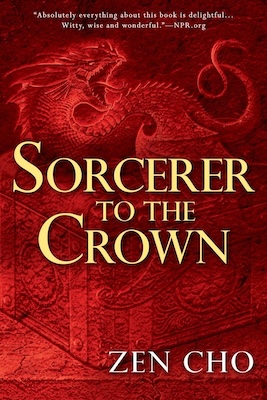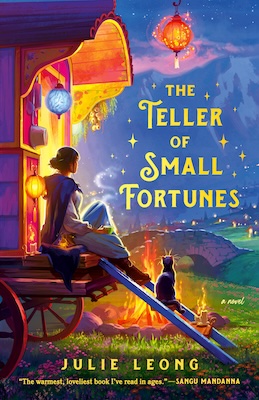Cozy fantasy is a fairly new term, and its definition is still being hammered out by the reading public. In my opinion, we should embrace the subjectivity of the term. “Cozy” is about how a book makes you feel. Since we all have different perspectives and life experiences, we may feel different things in response to the same book. I personally think that a cozy fantasy ought to be warm and comforting, but can still grapple with heavy themes.
I wrote my debut novel, The Teller of Small Fortunes, during perhaps the most difficult year of my life. We were all shut away in our homes and apartments, isolating ourselves against seemingly endless waves of COVID, when my family received the news that my father’s late-stage cancer had returned.
The doctors didn’t want to give an estimate, but when pressed, told us that they thought it unlikely that he’d survive another three months. What do you do in the face of news like that? What can you do?
Well, I quit my job, and began spending a great deal of time in the hospital. I found myself in ER waiting rooms, at his ICU bedside, waiting in the lobby for my mother to swap places with me. During all of this waiting, I turned to books for comfort, as I always have–but with everything around me feeling dark and turbulent, all I wanted was an escape. It was then that I discovered the nascent category of ‘cozy fantasy’–books with low stakes, warm vibes, and a great deal of heart.
I read all the books like these that I could find, and when I ran out, it occurred to me that I might try to write my own. And so I did, and I wrote a main character of the sort I’d always wanted to see more of: an immigrant who looks like me, and who has to grapple with the sense of not-belonging that is so familiar to those of the diaspora. The Teller of Small Fortunes is the story of a fortune-teller on the run from her destiny who gets roped into a mercenary’s search for his lost daughter, and must decide whether to risk everything to help him. It’s also a story about found family, baking, and a slightly magical cat.
My father has since defied his prognosis and is now in stable remission, and COVID no longer looms quite as large over our everyday lives. It feels like the worst of both storms has passed. But even without the need for escapism, I still turn to cozy fantasy as a source of joy. I’ve been thrilled to see cozy fantasy blossom and become more diverse as more and more readers discover it.
I hope that these books bring some much-needed magic and joy to you when you need it most, as they did for me.
The Very Secret Society of Irregular Witches by Sangu Mandanna
The Very Secret Society of Irregular Witches is arguably one of the canonical works of the modern cozy fantasy genre. Featuring magic and witches aplenty—including plucky heroine Mika Moon, who posts witchy videos on social media because surely nobody would think she’s actually a witch—The Very Secret Society is a warm, delightful novel about finding a family in unexpected places.
You see, in Mika’s Britain, witches meet rarely and only in secret (hence the title). The strict rules are ostensibly for their protection; if too many witches gather in one place, their accumulated magic risks exposing them all. But then Mika gets a message begging her to come to Nowhere House to teach three young witches how to control magic. It breaks all the rules, but she finds herself growing far too close to the inhabitants of the House, and must decide whether the danger is worth finally having somewhere to belong. A funny, delightful, and deeply kind book that’s impossible to read without smiling.
The Empress of Salt and Fortune by Nghi Vo
The first of Vo’s Singing Hills novellas, The Empress of Salt and Fortunes is a lyrical and atmospheric story-within-a-story. Chih is a cleric-historian traveling the land (along with their colorful bird companion) to collect stories for their sect. In their journey, they encounter an elderly woman named Rabbit, the last living servant of the previous Empress. Piece by piece, Rabbit tells Chih the story of the Empress and her exile, eventually revealing her own role in the Empress’ life. A subtle, moving novella that feels like being wrapped gently in a dream.

Sorcerer to the Crown by Zen Cho
Sorcerer to the Crown was published in 2015, well before the term “cozy fantasy” came into vogue, but offers a witty, lighthearted tone and plenty of fairy magic in a Regency England that suggests a cozy analogue to Jonathan Strange & Mr. Norrell. In telling the story of a former-slave-turned-Sorcerer-Royal and his mixed-race magical mentee, the book handles serious topics aplenty–institutional racism, sexism, and the looming threat of war among them–but does so with deft charm and humor.
The Nameless Restaurant by Tao Wong
The Nameless Restaurant is a companion novella to Tao Wong’s LitRPG urban fantasy Hidden Wishes series, but can be read as a standalone. It’s about a hole-in-the-wall restaurant in Toronto that’s magically hidden, featuring a reclusive chef and his patrons–some of whom are ordinary people, and others of which are heroes and powerful beings taking a break from their adventures to have a damn good meal. The novella lingers lovingly over details of the cooking process, featuring many luscious Malaysian dishes–if readers aren’t hungry before they start reading it, they certainly will be by the end. Light on plot, heavy on ambience and flavor.
The Full Moon Coffee Shop by Mai Mochizuki, translated by Jesse Kirkwood
This lovely little novel was a Japanese bestseller before being translated for English publication, and I fully understand why. The book follows a handful of modern-day protagonists whose lives intersect in more than one unexpected way. As each encounters a magical, pop-up coffee shop in the alleys of Kyoto run by talking cats who are more than they seem, they also find the wisdom and guidance they need to set their lives back on course. Dipping one paw out of fantasy and solidly into the realm of magical realism, The Full Moon Coffee Shop is a series of interconnected vignettes full of kindness, empathy, astrology–and, naturally, cats.
The Dallergut Dream Department Store by Miye Lee, translated by Sandy Joosun Lee
This novel follows Penny, a new employee at a department store that sells only one thing: dreams. People find their way to this store while asleep, in search of whichever dream they need most at that particular time, but have no memory of their visit once they wake. Lee’s worldbuilding is at once whimsical and full of thoughtful details, ranging from the method of payment for dreams (one half of the emotions elicited) to the roving talking cats that offer rented pajamas to nude dreamers. But the true heart of this book lies in the kindness with which Penny and her fellow dreamsellers treat their customers. From their well-stocked shelves come dream reunions with loved ones long gone, traumatic memories relived so that the dreamer can overcome them, creative inspiration for struggling artists–even an aging dog’s simple dream of its family returning home to play fetch. Through the eyes of the Dallergut employees, we come to think of dreams not as accidents of neurochemistry, but as works of art designed to heal and comfort.
The Rainfall Market by You Yeong-Gwang, translated by Slin Jung
The Rainfall Market is a novel-in-translation about a mystical market that appears only during the rainy season, its entrance hidden in an abandoned house, where humans can trade their misfortunes for happiness. Kim Serin is a young, impoverished girl with plenty of misfortune to barter, and she enters the market determined to buy herself a new life–but in sampling the lives on offer, finds that perfect happiness is more elusive than it seems. The Spirited Away vibes are strong in this one, as are the vibrant personalities of the market’s resident Dokkaebi (spirits/goblins) and the magically size-changing cat companion. A gentle, affirming story about finding happiness in those who love you.
Take a break from the news
We publish your favorite authors—even the ones you haven’t read yet. Get new fiction, essays, and poetry delivered to your inbox.
YOUR INBOX IS LIT
Enjoy strange, diverting work from The Commuter on Mondays, absorbing fiction from Recommended Reading on Wednesdays, and a roundup of our best work of the week on Fridays. Personalize your subscription preferences here.

